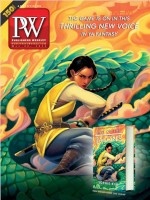Authors Eliot Schrefer and Brandy Colbert withdrew from separate book appearances within the past year over censorship concerns—Schrefer from the Plum Creek Literacy Festival and Colbert from a Black History Month presentation. Below, they discuss why they took a stand.
Colbert: Eliot, we experienced surprisingly similar situations with book censorship over the past year. First, you were set to attend the Plum Creek Literacy Festival and then withdrew after seeing that your LGBTQ YA book The Darkness Outside Us was missing from the order form—along with another celebrated LGBTQ YA book—and discovering that the host college had a policy to discipline students for “active involvement in a homosexual lifestyle.”
Schrefer: Yes, that captures it! Then, a few months later, you were invited to present to a school district in Texas, except they said a few days beforehand that they didn’t want you discussing your newest book, Black Birds in the Sky: The Story and Legacy of the 1921 Tulsa Race Massacre, as it was “too controversial.” When your publisher pushed back, the organizers decided not to censor your presentation, but said they would not purchase Black Birds as part of the book buy-in for students, choosing one of your backlist titles instead. You withdrew.
Colbert: All this at an event that was expressly designed to honor Black authors during Black History Month! Both of our cases seem like soft censorship to me, in that the organizers didn’t object to our presence and overall work, but refused to provide students with access to specific books. I think it’s even more important to push back against this type of censorship, as it’s still quite harmful and can lead to more blatant bans.
Schrefer: Soft censorship is usually invisible, which is why it’s so effective. We both happened to be in situations where it was revealed. Me because I clicked on an order form; you because the school district became scared of the “CRT” bogeyman.
Colbert: It’s difficult to turn down appearances where we’ll get to meet and interact with our readers, but it’s vital that we stand up for ourselves and our work. Allyship is also important; authors whose work hasn’t or won’t be censored should stand by the authors whose books are under attack. In your case, I was pleased to see so many other authors withdraw.
Schrefer: Though Plum Creek announced a new roster of participating authors for this fall. You’re so right about the allyship piece. It wasn’t until I was in the crosshairs and getting hate mail that I realized how important every message of support was. It’s changed the way I behave when I’m the bystander to a similar situation, now. I’m more assertive.
Colbert: How does this affect you personally?
Schrefer: I’m glad you asked about the emotions piece. I felt unexpected shame that I thought I’d left behind in the 1990s. Some deep part of me was ready to hear that gay content was unacceptable, because that’s what I’d been told as a child.
Colbert: I was one of very few Black kids in my classes from elementary to high school. While tolerance was often practiced, most of the white people I grew up with showed little to no interest in learning about Black culture. This censorship primarily angered me, but then shame started to come up, too. It was as if they were saying I’d done something wrong by simply writing a factually accurate book about Black history and what it means to be a Black American.
Schrefer: That’s part of what gives these challenges so much power, right? We all have internalized racism and misogyny and homophobia, which leads some to believe deep down that it’s books about straight white boys or bunnies that are core children’s literature, and anything else is edgy or provocative and lucky to be published in the first place.
Colbert: The inclusion of diverse books supposedly makes kids who don’t personally identify with them uncomfortable—but what about the other kids, who’ve felt uncomfortable all these decades? These books should be included in libraries and curriculum so everyone can see themselves and so that kids who do not belong to these groups can learn about others and develop empathy from a young age.
Schrefer: This growing crisis is about people in power excluding voices that could cause them extra work or give them heat—and people with even more power whipping up this situation to drive their voting base.
Colbert: Yes! And as more authors, librarians, students, and allies push back against censorship, I hope these people in power realize they can’t continue attacking specific books without a fight.
Brandy Colbert writes books for children and teens. Her latest, Black Birds in the Sky: The Story and Legacy of the 1921 Tulsa Race Massacre, was a finalist for YALSA’s Award for Excellence in Nonfiction. Eliot Schrefer has twice been a finalist for the NBA for Young People’s Literature. His newest book, Queer Ducks (and Other Animals): The Natural World of Animal Sexuality, was published May 24.



 Volume 269
Issue 23
05/30/2022
Volume 269
Issue 23
05/30/2022





